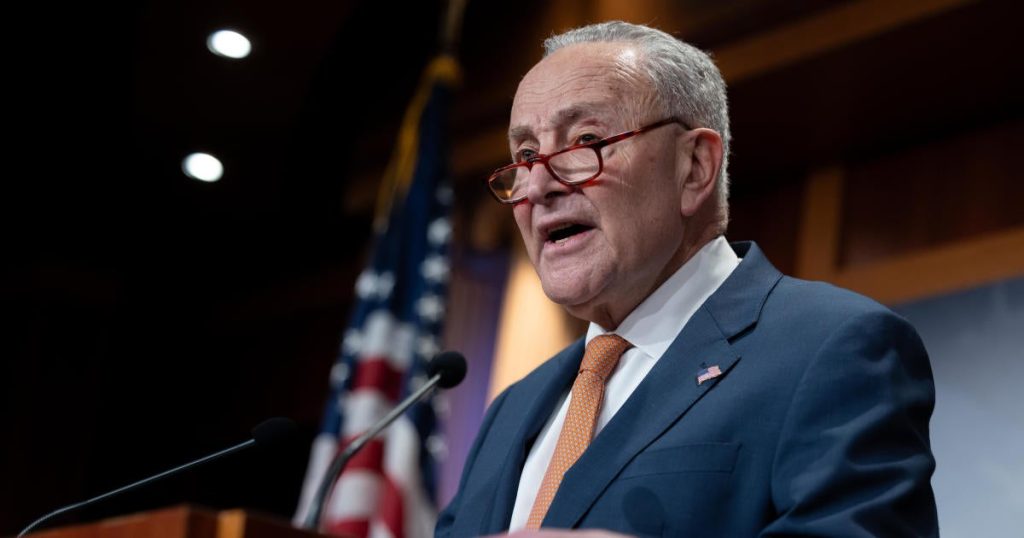Democrats Launch Multi-Front Strategy to Counter Trump Administration’s Agenda
The political landscape in Washington, D.C., has grown increasingly contentious as Senate Minority Leader Chuck Schumer unveiled a robust, multi-faceted strategy to push back against the Trump administration. In a letter to his Democratic colleagues, Schumer outlined what he described as a "coordinated assault" by President Trump and his allies, which he argued runs counter to the interests of the American people. The strategy, designed to combat what Schumer characterized as a concerted effort to dismantle critical government services and enrich the wealthy at the expense of working families, includes oversight, litigation, legislation, and a coordinated communications effort. Schumer made it clear that Senate Democrats are prepared to fight on multiple fronts to protect the values and priorities of the American people.
At the heart of Schumer’s critique is the assertion that the Trump administration and its Republican allies are engaged in a systematic effort to undermine the government and hand over power to what he called "21st-century robber barons." Schumer painted a stark picture of an administration that is gutting federal agencies, cutting vital services, and prioritizing the interests of the wealthy and powerful over those of everyday Americans. He pointed to specific actions, such as granting Elon Musk’s team access to Treasury Department data, as evidence of this broader agenda. Schumer’s message was clear: the Republican Party’s entire platform, in his view, is centered on further enriching the rich while leaving working families behind.
Schumer detailed four key areas where Senate Democrats plan to challenge the Trump administration. First, he emphasized the importance of oversight, noting that Senate committees are leveraging their congressional authority to investigate the "intent, legal justification, and real-world impact" of the administration’s actions. Schumer also announced the launch of a new whistleblower portal, designed to facilitate reports of corruption, abuses of power, and threats to public safety. This move signals a commitment to transparency and accountability, as Democrats seek to uncover and expose what they see as improper conduct within the administration.
In addition to oversight, Schumer highlighted the role of litigation as a critical tool in the Democratic arsenal. He framed the courts as the "first line of defense" against the administration’s actions, suggesting that Senate Democrats will actively support legal challenges to policies they deem harmful or unconstitutional. Schumer also acknowledged the limitations imposed by the Republicans’ 53-seat majority in the Senate, which falls short of the 60-vote threshold required to pass most legislation. Despite this, he expressed confidence that Democrats can use their votes strategically to "steady the ship" for the American people during these turbulent times. This includes supporting legislation to fund the government and prevent a shutdown, with a looming deadline next month.
The fourth and final component of Schumer’s strategy is a coordinated communications and mobilization effort, spearheaded by Sens. Amy Klobuchar of Minnesota and Cory Booker of New Jersey. This initiative aims to keep Senate Democrats informed, united, and vocal in their opposition to the Trump administration’s agenda. Schumer credited this effort with already achieving a significant victory: the halting of a controversial Office of Management and Budget memo that had directed federal agencies to pause assistance programs. By amplifying the truth behind the administration’s actions, Schumer argued, Democrats can build public awareness and resistance to policies that harm American communities.
The Democratic pushback comes in the wake of the 2024 elections, which saw key victories for Republicans and left the Democratic Party grappling with its path forward. However, Schumer and his colleagues appear determined to harness momentum, particularly in response to recent Trump administration actions that have sparked confusion and criticism across the federal government. As the battle between the executive branch and Senate Democrats intensifies, one thing is clear: the stakes are high, and the outcome will have profound implications for the direction of the country. Schumer’s strategy represents a bold attempt to reclaim the narrative and fight for the values that Democrats believe are under siege. Whether this approach will resonate with the American people and succeed in countering the Trump administration’s agenda remains to be seen, but there is no doubt that the coming months will be marked by fierce political battles in Washington.












